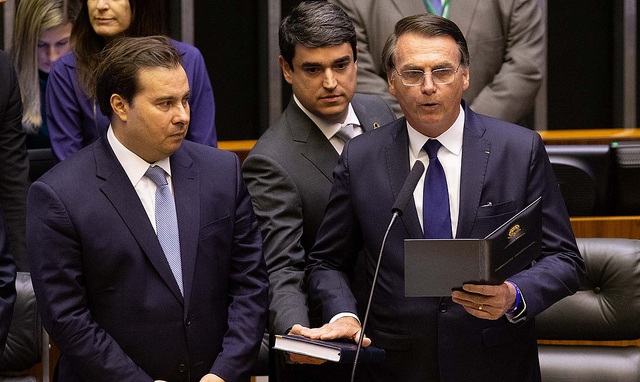After a highly polarized election marked by violent incidents and fake news scandals, amid internal contradictions facing his transition team and statements that he constantly takes back about the policies he plans to implement in his administration, the far-right politician Jair Bolsonaro was inaugurated as president of Brazil today, Jan. 1, in the capital of the country, Brasília.
Twelve heads of state and 60 foreign delegations attended the ceremony, including the Israeli prime minister Benjamin Netanyahu and the controversial Hungarian premier Viktor Orban.
The gigantic structure of the inauguration ceremony included an unprecedented security plan by the Brazilian Air Force, only similar to operations implemented for big sporting events such as the 2014 World Cup and the 2016 Olympic Games. Last week, nearly 5 million people in Brasília received an unusual WhatsApp message from the Army Special Operations Command regarding security restrictions during the inauguration, exposing Bolsonaro’s close ties with the army. It was the first time the Armed Forces contacted the population directly since the military dictatorship ruled the country, between 1964 and 1985.
Bolsonaro’s predecessor, Michel Temer, leaves office as the most unpopular president in Brazil’s democratic history. His latest records, from early December, showed 74 percent of Brazilians find the Temer administration bad or terrible, while 88 percent disapprove of the way he ran the country, according to pollster Ibope.
Economy
Not only is the new president’s ultra neoliberal economic platform not different from that of Temer, it actually puts forward further plans to sell state-owned companies in strategic industries, such as oil and electric power.
He also intends to push unpopular reforms that could have major impact in ordinary people’s lives. Right after the election, Bolsonaro told Record TV channel he would go to Brasília to lobby to have at least part of the Pension Reform bill that is stalled in Congress passed – an early poll by Datafolha showed seven in ten Brazilians oppose the reform.
Cabinet
While Bolsonaro ran on an anti-corruption campaign, at least nine of his 22 appointed ministers – seven more than what he had originally promised – are being investigated or accused in a court of law of white-collar crimes. That includes Ricardo Salles, who will be in charge of the Ministry of the Environment; Bolsonaro’ Chief of Staff, Onyx Lorenzoni; Tereza Cristina, head of the Ministry of Agricultura; the future minister of Health, Henrique Mandetta; and the head of the Tourism cabinet, Marcelo Álvaro.
Who is Bolsonaro
Sixty-three-year-old Jair Bolsonaro is a retired army captain who has been a congressman for 27 years. In his seven terms as a member of Congress, only two of the bills proposed by him were passed: one that exempted technology products from a tax called IPI, and a bill to authorize the use of a so-called “cancer pill,” which was later barred by the Supreme Court.
While his track record as a congressman for nearly three decades has been far from impressive, the far-right politician infamously gained notoriety over the years for his defense of Brazil’s military dictatorship and his offensive remarks against minorities and political opponents.
He has outspokenly opposed left-wing and people’s movements throughout his political career and gained momentum during the 2018 presidential campaign with his controversial, authoritarian opinions, actually telling supporters during rallies that in his administration they would “kill them all,” referring to Workers’ Party supporters, and “wipe out the red bandits,” referring to leftists in general.
After he was elected, Bolsonaro stated that “the opposition is welcome” and “freedom of speech is sacred.” “We will run the country for 208 million people, not just those who voted for me,” he said. However, activists and left-wing scholars were not convinced.
Women, black people, indigenous people, quilombolas – residents of quilombos, settlements set up in Brazil’s rural areas, mostly by escaped enslaved people of African descent –, and minorities in general were also targeted in different moments by the now president, who says he will not grant them “special treatment” in his government.
The new president has also constantly attacked social movements such as the Landless Workers’ Movement (MST) and the Homeless Workers’ Movement (MTST), claiming that, once in office, he would label them as terrorist organizations.
Backlash and scandals
In 2016, Bolsonaro voted to impeach ex-president Dilma Rousseff, paying tribute, in the occasion, to colonel Carlos Alberto Brilhante Ustra, calling him “Dilma Rousseff’s nightmare.” The colonel was in charge of torture sessions against Rousseff during the military rule in the country, when she fought against the regime.
This year, during the election process, Bolsonaro was targeted by the #EleNão (“Not Him”) campaign, which mobilized millions of people across the country.
In the final stretch of the runoff vote, an investigative news story published by newspaper Folha de S. Paulo exposed that pro-Bolsonaro companies were paying for illegal bulk messaging services against the Workers’ Party (PT) on the highly popular messaging app WhatsApp, directly benefiting Bolsonaro.
The PT filed a petition for the country’s electoral court to investigate whether Bolsonaro’s campaign committed abuse of economic power and undue use of means of communication. If he is convicted, Bolsonaro could be removed from office.





